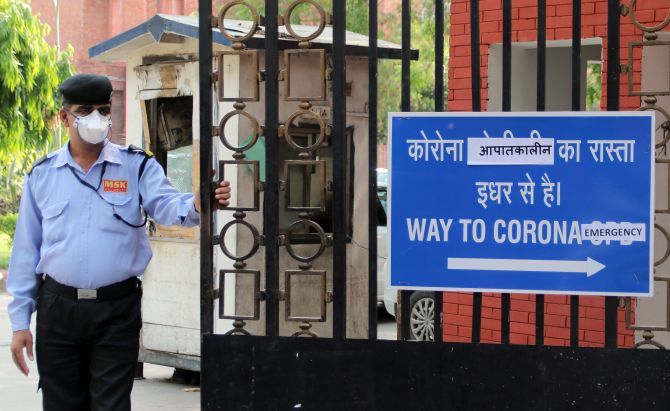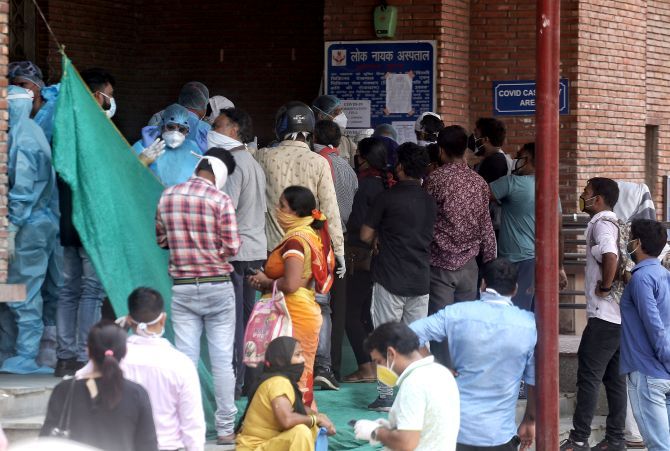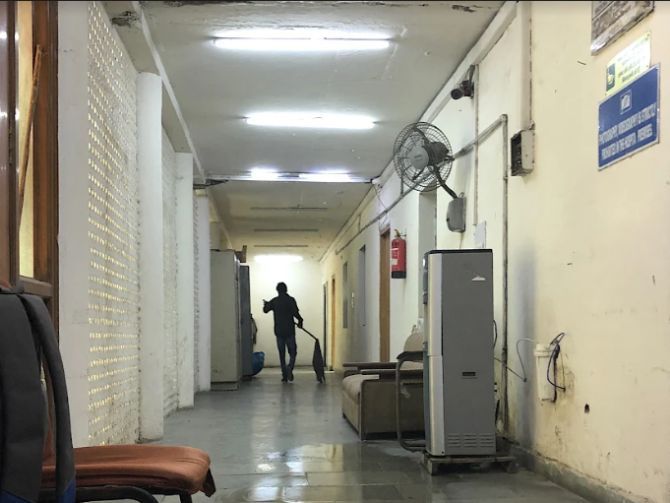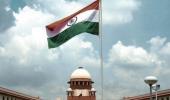New Delhi's Lok Nayak Jayaprakash Narayan hospital is the ground zero of COVID-19 treatment in India.
It is an exclusive hospital with 2,000 beds dedicated to combating coronavirus.
Nowhere in India are so many coronavirus patients being treated under one roof.
This 'garib ka hospital' was never spic and span or efficient even in normal times.
And now the fears of getting below average medical treatment are so high that a 2,000-bed hospital is half empty at the height of India's biggest health crisis, report Sheela Bhatt and Aniruddh Sheth.

Seema Kumari is weeping outside the main entry point of the COVID-19 wards at the Delhi government-run Lok Nayak Jayaprakash Narayan hospital.
Her husband Vinod Kumar, an autorickshaw driver, is COVID-19 positive. He has been admitted to the LNJP hospital, but Seema has not been able to contact him at all for 48 hours.
She is not just anguished, but petrified.
She fears the worst and tells the staff manning the gate, "Unka koi ilaj nahi ho raha hai. Unko discharge karo (he isn't getting any treatment, so discharge him)."
All over India, the trauma of coronavirus-infected patients and their relatives's anxieties have been extraordinarily high because the patients, once hospitalised, are not allowed to meet relatives or friends.
Except luxurious and cash-rich hospitals, no private or government-managed hospital has a sensitive and efficient communication system to keep relatives fully informed about a patient's condition.
This act of omission has created complete chaos, resulting in psychological issues hard to ignore and tough to handle when the patients's condition worsens.
The decision to not allow any attendant or relative of a patient even at a safe social distance has been justified on health grounds as coronavirus is very infectious.
But this is a completely un-Indian move, particularly in the difficult environment of government-run hospitals where even under normal circumstances the poor and resourceless struggle with diseases as much as with issues of cleanliness, supplies of medical equipment, lack of information about the real status of the patient and professional attendance of medical staff.
So for days together, COVID-19 patients don't see their family or relatives, creating serious distress in them.
Their fears and brooding multiply which in turn creates a chain reaction of events and many a time results in panic situations.
Premai Devi, a COVID-19 patient, was admitted to the LNJP hospital but without familiar faces around she lost her mental strength if not balance. She called her son to complain that she is surrounded by three dead bodies and another patient on the next bed is about to die.
Without seeing any relatives around for many days she started having hallucinations. She called her son using someone's phone and told him, 'Yahaan toh bas lashe hi lashe hain (there are only dead bodies around).'
Her relatives shared this story with Seema who watched, the previous night, on a Hindi television news channel, horrifying videos of completely naked dead bodies of patients lying unattended in one of the wards at this giant hospital.
Since then, Seema has been so petrified about this sarkari hospital that she rushed in the morning to take her husband home.
Video footage about negligence of patients at this and many other hospitals are as tragic as the countless stories of Indians who walked hundreds of kilometres to be with their families.

For Indians who strongly believe in the family system, social togetherness in times of crisis and for those who believe in giving physical solace through physical contact with their loved ones are just not able to take it easy these days.
One understands physical distancing is a must but the hospital managers should have well thought out system to keep information flowing between relatives and patients.
The restriction of not meeting their loved ones during hospitalisation is adding to the suffering.
It creates overwhelming fear and avoidable suspense. Entering a large medical facility under any circumstance is most often a very anxious experience.
Right from the gate of the LNJP hospital, there is an air of confusion and uncertainty.
Since a video of reported mismanagement inside the hospital was released by a disgruntled staff member, many relatives want their mothers, fathers, and grandparents to be released so that they can seek "better medical care" someplace else.
When asked "Are you planning to take them to a private hospital? How are you going to afford it?" a labourer from Jasola village replies, "I will wait at private hospitals for hours if I have to, but my brother will not stay here a minute longer."
Another man had his brother admitted to the COVID-19 ward at the LNJP hospital two days earlier and soon tested positive for the virus. Over the next 48 hours, and numerous phone conversations later with his brother, the family came back to the hospital saying no "real" medical care is being given and that they would like to take their family member to another hospital.
Gaurav, who runs an ambulance service and has visited LNJP hospital wards many times, says, "The Covid patients are full of anxieties and vulnerable to believe any stories because no family member is with them at the time of crisis."
"They cry to meet their sons and daughters. These patients are not able to comprehend why they can't see anybody for days together. Unko dar khaye ja raha hai (their fear is the real killer)," explains Gaurav.
The Lok Nayak hospital is the ground zero of COVID-19 treatment in India. It is an exclusive dedicated hospital with 2,000 beds dedicated to combating coronavirus.
Nowhere in India are so many coronavirus patients being treated under one roof.
But the fear of 'sarkari' treatment is such that along with Seema many other patients's relatives too cry for help to know the condition of their relatives inside the wards.
"These sarkari hospitals are impossible," says a young girl. "My father died two days ago, but I haven't got his body yet."
Coronavirus is an extremely infectious virus and only because of its lethal speed of spreading was it decided by all hospitals to keep their premises free from attendants of patients or relatives who have many times become a nuisance as they crowd waiting areas.
But these days it has become an excuse for the sarkari management at hospitals to hide their inefficiencies.
This "garib ka hospital" was never spic and span or efficient even in normal times.
The fears of below average treatment are so high that a 2,000-bed hospital is half empty at the height of the health crisis.
Those 1,200 empty beds speak volumes about the quality of treatment at the LNJP hospital.
The panic and hesitation just outside the gates are filled with questions and doubts regarding "treatment" and "care-giving".
After asking endlessly for hours, "Is my mother okay?" "Does my father need anything?" "Is my brother getting better?", family members, who have travelled for hours to reach the closed doors of COVID-19 wards are given dispassionate responses aimed at ending the conversation.

The tragedy is that despite representing some of the lowest income groups, these family members were seen maintaining social distancing. They wore masks, gloves and even contained somewhat their emotional upheaval in such harrowing circumstances.
Many people sat on makeshift pavements across the medical facility, waiting for news of their family members but while doing so were seen sanitising their hands regularly.
One can easily understand the fear within Seema when she falls short of words to explain why zero communication with her husband will kill her before coronavirus affects her husband.
Asked about the LNJP hospital's response to coronavirus, the hospital's Medical Director Professor Dr Suresh Kumar declares, "The hospital is providing the best care in North India."










